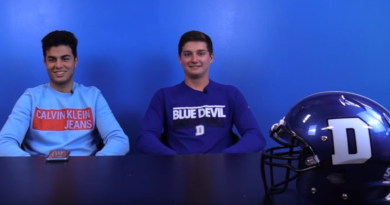Students volunteer to improve college chances
Principal Jacquelyn Moore stood at the front of the sophomore start-of-the-year assembly, trying to motivate students into participating more.
“On your college transcripts, it looks wonderful if you’re involved,” Moore listed as a reason, echoing the belief many DHS students share—that volunteering makes their college applications look more attractive. Behind her, a screen changed projections, listing clubs and community service groups at DHS.
Allison Yates, a sophomore who volunteered over the summer at the SPCA, believes that about 25 to 30 percent of students at DHS have volunteered “so they would stand out to colleges.”
In today’s competitive academic environment, where the average overall high school GPA of those attending a UC in 2009 was 3.91, students struggle to find ways to make colleges notice them.
The DHS website has a section devoted to community service, encouraging students to offer their time and claiming that “whether to enhance future college applications, to help enrich the lives of others, or just to help make our community a friendlier place to live, volunteering is often a very rewarding experience for everyone involved.”
But DHS head counselor Courtenay Tessler said “it’s not a good reason” to volunteer just for college applications. She added, however, that “it’s always good to give back. You get a lot back for yourself personally.”
“Your unique combination [of extracurriculars] might be just what [colleges] are looking for,” Moore later said.
Tessler agreed. “You have to go beyond yourself… You have to be involved,” she said.
But some struggle as to whether trying to appeal to colleges really helps applicants.
Emily Johanson is a former DHS student who is currently a sophomore at George Washington University, and who has volunteered in Panama and, more recently, in Palestine. “The original purpose of adding volunteer service to applications was to find originality. However, it seems to have filled the opposite role,” she said.
Johanson doesn’t think that volunteering helps students define themselves as unique to colleges. “Our culture is so over-achieving and inevitably false, that we cause young people to feel that they must fill a cookie cutter shape in order to ‘succeed’,” she said.
Johanson also said that she thinks that college admissions readers would “see through to the true motivations of the applicant.”
Jodie Dorroh, a UC Davis college admissions officer, thinks differently. “Obviously people that have been volunteering for two years, we’ll look at them better than someone who did it for a school project,” she said. But she said her office does not try to separate those who genuinely volunteered their time from those who didn’t.
Tessler believes that colleges encourage volunteering so as to see what applying students are passionate about, and so that colleges “look at you as an individual.”
But for Tessler, there’s another side to the students applying to colleges.
“The sad part for me… [is when] I go [to seniors] ‘Well, what did you do?’ and they go ‘Well, sometimes I babysit,” Tessler said.


